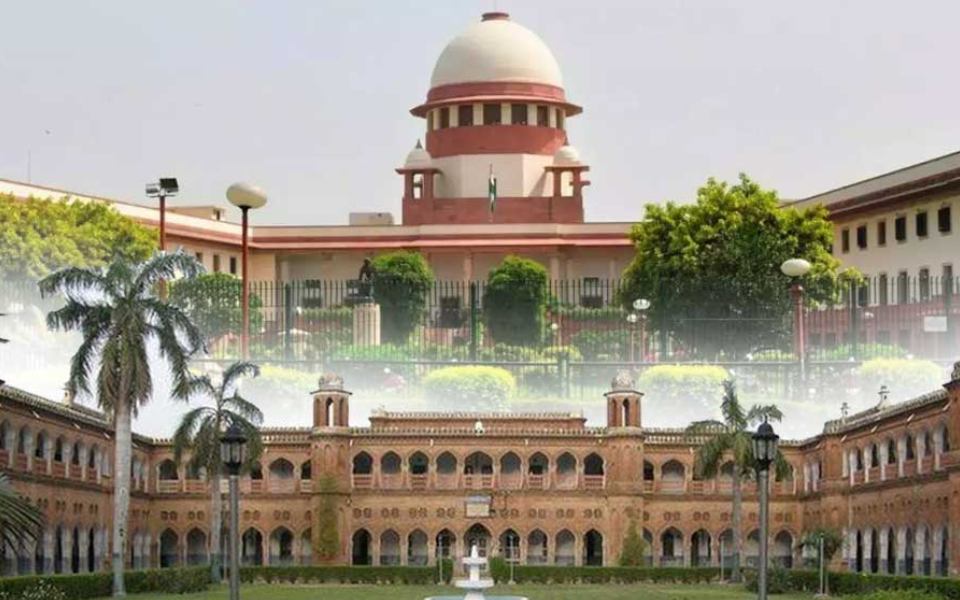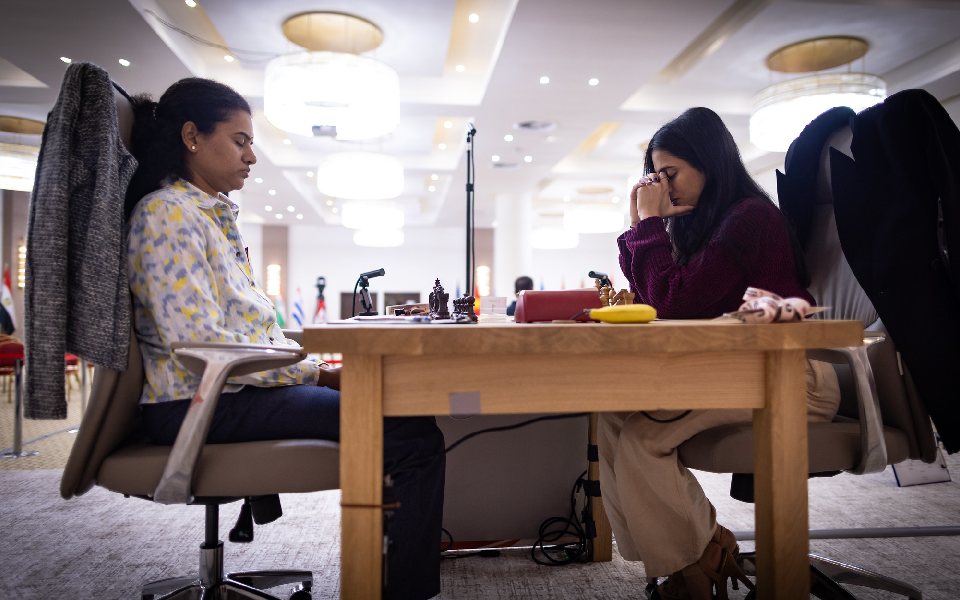New Delhi, Jan 24: The Supreme Court on Wednesday expressed surprise over the Centre's stand that it does not accept the 1981 amendment to the Aligarh Muslim University (AMU) Act, which effectively accorded minority status to the institution, and said the government has to stand by what Parliament has done.
A seven-judge constitution bench headed by Chief Justice D Y Chandrachud, which is hearing arguments on the vexed question regarding the minority status of AMU, observed Parliament is an "eternal, indestructible body" under the Indian Union.
"How can you not accept an amendment by Parliament?" the CJI asked Solicitor General Tushar Mehta, who was arguing for the Centre.
"Mr Solicitor, Parliament is an eternal, indestructible body under the Indian Union, and irrespective of which government represents the cause of the Union of India, Parliament's cause is eternal, indivisible and indestructible and we can't hear the Government of India say that amendment which the Parliament made is something I don't stand by. You have to stand by it," Justice Chandrachud observed.
The bench, which also comprised Justices Sanjiv Khanna, Surya Kant, J B Pardiwala, Dipankar Datta, Manoj Misra and Satish Chandra Sharma, said the government has the option of taking the amendment route and amend the law again.
"This is an amendment by the Parliament (in 1981). Is the government accepting the amendment?" Justice Khanna asked.
"I am not," Mehta responded.
The law officer said he was not arguing a matter of "A versus B" and that he was before a seven-judge constitution bench answering constitutional questions.
"The amendment in question was subjected to challenge before the (Allahabad) high court and there is a judgement declaring that it is unconstitutional for A, B, C, D grounds, and as a law officer, it is my right as well as my entitlement and duty to say that this view appears to be correct," he asserted.
The Allahabad High Court had in January 2006 struck down the provision of the AMU (Amendment) Act, 1981 by which the varsity was accorded minority status.
The CJI said this would be "radical" because a law officer would be then telling the court that "I don't abide by what Parliament has done".
"You have to stand by what Parliament has done. Parliament is supreme. Parliament is undoubtedly supreme in its law making function. Parliament can always amend a statute, in which case a law officer can say I have an amended statute," Justice Chandrachud observed.
"Can we hear any organ of the Union government say that notwithstanding a parliamentary amendment, I don't accept this amendment," the CJI said, adding Parliament is an eternal, indivisible and indestructible entity under democracy.
Mehta said he was supporting the 2006 high court verdict.
"How can you say I don't accept the validity of an amendment?" the bench asked him.
Responding to the query, the solicitor general said, "Would a law officer be expected to say that whatever amendments were made in the Constitution of India during Emergency were true only because they were made by the Parliament".
The CJI observed that is why the 44th amendment Act, 1978 came in.
"The 44th amendment came in only for that. The 44th amendment came to redress the evils which were perpetrated in the name of a constitutional amendment," he said, adding, "The power to decide that is in the elected body of the people which is Parliament. Parliament can always say that what we did during Emergency was wrong and we are rectifying it by the 44th amendment".
The 44th Amendment Act was brought in by the Janata Party government against the background of Emergency.
It proposed certain changes to the Constitution that would have the effect of undermining its secular or democratic character, abridging or taking away fundamental rights, and prejudicing or impeding free and fair elections on the basis of adult suffrage.
It said the right to property, which has been the subject of several constitutional amendments, would cease to be a fundamental right and become just a legal right. The elimination of property from the list of fundamental rights would, however, ensure that minorities' freedom to create and govern educational institutions of their choosing would not be harmed, the 44th amendment said.
Mehta referred to the high court verdict and said the 1981 Amendment Act was set aside and therefore, it was not in the statute book now.
"There is an affidavit filed by the government. It's not my stand ," he said.
Senior advocate Kapil Sibal, appearing for one of the parties in favour of AMU's minority status, referred to how the then attorney general had defended the Emergency provision.
"I was sitting in the court when the then Attorney General of India Niren De was standing here and arguing what is being done is right. I (attorney general) defend the Emergency provision. Why? Because he could not say otherwise," Sibal said.
Mehta said the distinction is that the then attorney general was not in a situation where one high court has struck it (1981 amendment) down and the provision no longer exists in the statute book.
The arguments in the matter remained inconclusive and would resume on January 30.
The top court had on February 12, 2019 referred to a seven-judge bench the hugely contentious issue for adjudication. A similar reference was made earlier.
A five-judge constitution bench had in the S Azeez Basha versus Union of India case in 1967 held that since AMU was a central university, it cannot be considered a minority institution.
However, it got back its minority status when Parliament passed the AMU (Amendment) Act in 1981.
The Congress-led UPA government at the Centre moved in appeal against the 2006 high court order. The university also filed a separate petition against it.
The NDA government spearheaded by the BJP told the apex court in 2016 that it will withdraw the appeal filed by the erstwhile UPA dispensation.
Let the Truth be known. If you read VB and like VB, please be a VB Supporter and Help us deliver the Truth to one and all.
Batumi (Georgia), Jul 26 (PTI): Young Indian International Master Divya Deshmukh held her nerves to hold stalwart Koneru Humpy to a draw in game 1 of the FIDE Women's World Cup final, with both players having their share of opportunities to take the lead here on Saturday.
The draw with black means Humpy, the two-time World Rapid champion, holds a slight edge going in the second and final game under the classical chess rules in the two-game mini-match, and should the deadlock continue, games of shorter duration will be played to determine the winner.
Humpy employed the Queen's gambit accepted as black and it turned out to be a pretty fascinating game right out of the opening as Divya, 19, came up with a piece sacrifice early to deny the black king the right to castle.
Humpy was the first to err and, according to computers, Divya had things under control on the 14th move. However in her bid to recover the extra material, the Nagpur girl, who has secured a place in the Candidates tournament with her sterling performance here, missed a promising continuation.
What followed the exchange of all minor pieces and the ensuing queen and rook endgame gave enough counter play to both players. The game was eventually drawn after Humpy sacrificed her rook to force perpetual checks.
"The game saw an extremely sharp battle with the game ending in a draw in 41 moves. On move 7, Divya made her aggressive intentions clear by offering another pawn,
which looked like home preparation. Humpy made a practical decision of refraining from taking the pawn and a balanced position was reached by move 10 by white," said Grandmaster Pravin Thipsay, an Arjuna awardee and the first Indian to get a chess Grandmaster norm.
"However, instead of developing the undeveloped Knight, Humpy retreated the centralised Knight on move 10, giving huge positional advantage to Divya. Divya could have gained huge positional advantage on the 12th move by moving a rook. However, she chose to play for King side attack by sacrificing a piece instead.
"Humpy, too, erred at this stage and instead of moving the King to Queen side, moved it to the King side. Divya, on move 14, could have obtained a crushing attack by threatening a mate by developing her Queen. Instead she chose to exchange a pair of Bishops first, which enabled Humpy to defend her King by returning the piece," said Thipsay.
"Players thus reached a balanced Queen and two Rooks ending. Divya continued to play ambitiously and tried to attack Humpy’s King but the latter defended accurately and the game was drawn in 41 moves by perpetual check," he added.
In the play-off for the third place, Chinese players Zhongyi Tan, the former women's world champion and top seed Lei Tingjie also decided to split points out of a Queen’s gambit declined game.
The opening raised visions of a close contest between the two but having been knocked out of title race in the previous round, none of them wanted to take any huge risk. It was still a middle game when the players shook hands.
With the top two positions sealed for the Indians, the berth to the next Candidates is also assigned, while the player finishing third will also get an entry to the premier event scheduled for 2026.
Results: Divya Deshmukh (Ind) drew with Koneru Humpy (Ind); Zhongyi Tan (Chn) drew with Tingjie Lei (Chn).





